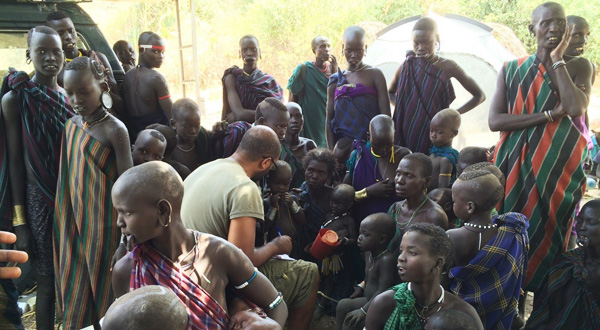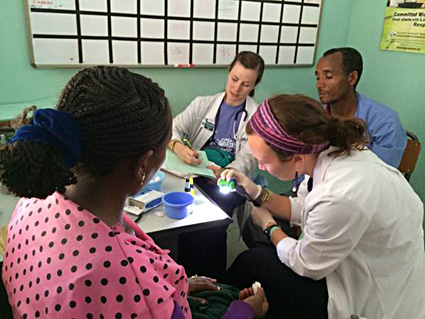By Ken Camp
Student nurses grow accustomed to signs prohibiting firearms and other weapons on hospital property. So, treating spear-carrying tribesmen at a remote clinic on the banks of the Omo River in southern Ethiopia required mental adjustment for five Baylor University graduate students and their faculty sponsor.
“You get used to it,” said Lori Spies, family nurse practitioner and missions coordinator at Baylor’s Louise Herrington School of Nursing.
Students also learned to “get used to” recognizing symptoms of malaria and malnutrition — as well as treating patients afflicted with parasites and amoebas — during their month-long medical mission to Ethiopia, she noted.
Spies, who attends Lake Pointe Church in Rockwall, Texas, has traveled to Africa about 20 times since 2005, and she has led about a dozen student mission trips.

“These are students who have expressed an interest in working on the mission field,” she said of her charges. Students worked alongside career missionaries and local evangelists, who told Bible stories and shared the gospel with people who waited in line at clinics.
The student nurses participated in health and hygiene education, conducted home visits, and learned to diagnose and treat a variety of conditions rarely seen in the United States.
Students saw about 100 patients daily at a high-volume clinic in Langano, a predominantly Muslim area more than three hours south of Addis Ababa. Kim Scheel, an alum of Baylor’s nursing school and career missionary with the Serving in Mission organization, started the Bishaan Jireenya —Water of Life — Clinic 20 years ago.
They also worked at Makki, about 500 miles south of Addis Ababa, among the Mursi people.
“It’s a very remote area, but there is a school planted there to provide Christian education. We were able to do school physicals for the little ones,” Spies said.
Mursi tribesmen who have become Christians launched an outreach to the even more remote Kwegu people in the Lower Omo Valley, and the student nurses helped support that effort by offering medical care in a tent they pitched along the riverbank.
“It was a steep bank, and there were crocodiles in the river,” Spies said. “Needless to say, there was no wading in that river.”
The student nurses treated multiple cases of skin diseases and malaria among the isolated Kwegu, who number only about 1,000 people.
“It was a profound spiritual experience, seeing meaningful outreach led by new believers, offering ministry to unbelievers,” Spies said.
Students also had the satisfaction of knowing their training made a life-changing difference.

“They caught some hard-to-diagnose things and saved some lives,” Spies said.
One small child — who was not running a fever or crying — was septic after a bout with pneumonia. A woman who had sustained significant blood loss when giving birth at home was dehydrated and anemic.
Working alongside a missionary physician, they also helped deliver six babies during their time in Ethiopia.
“I can see the students becoming wonderful family nurse practitioners,” Spies said.
In addition to leading student trips to Ethiopia, she also leads annual professional development workshops in Uganda. Through Baylor’s partnership with Northrise University in Zambia, she anticipates additional mission opportunities to develop.
“I feel very blessed,” Spies said. “I believe I am fulfilling God’s calling on my life.”
